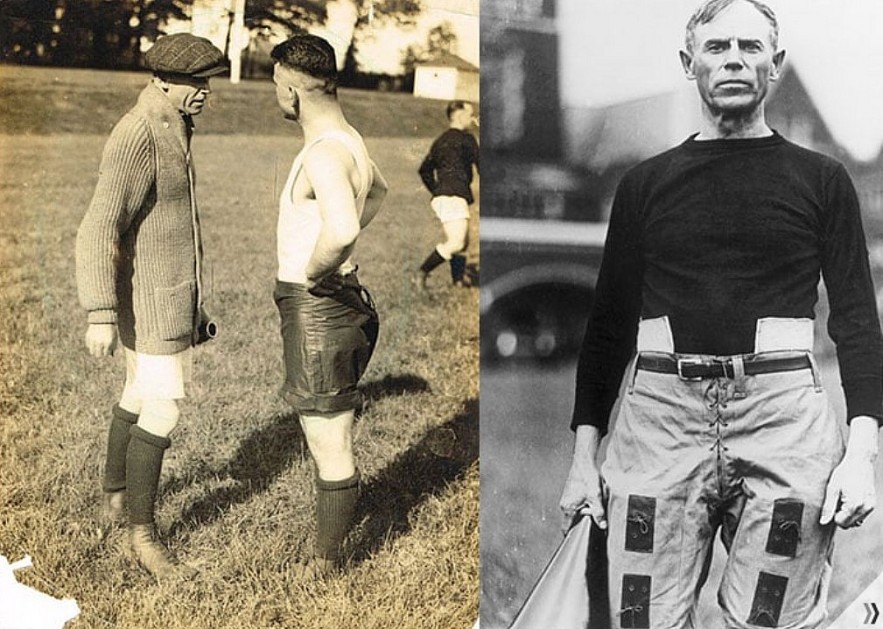Who is John Heisman and What is the Heisman Memorial Trophy?
 Who Are The Best And Most Famous South American Footballers Today - Top 10 Who Are The Best And Most Famous South American Footballers Today - Top 10 |
 Why Is Football Not Popular In America and Why Called Soccer? Why Is Football Not Popular In America and Why Called Soccer? |
John William Heisman and the Heisman Memorial Trophy
John William Heisman is a name synonymous with innovation and excellence in American football. As a legendary coach and football pioneer, Heisman revolutionized the game with his strategic mind and forward-thinking approach.
Decades after his passing, his legacy lives on, immortalized in the Heisman Memorial Trophy, the most coveted individual honor in college football. This prestigious award not only celebrates athletic excellence but also embodies the spirit of sportsmanship and determination championed by Heisman himself. Understanding the man behind the name offers a deeper appreciation of his enduring influence on the sport.
Who Was John Heisman?
 |
| John William Heisman |
Born on October 23, 1869, in Cleveland, Ohio, John Heisman grew up in a time when football was a fledgling sport. He attended Brown University before transferring to the University of Pennsylvania, where he played football and honed his understanding of the game. As a player, Heisman showed a natural aptitude for leadership and strategy, qualities that would later define his illustrious coaching career.
Heisman began coaching in 1892, working at various institutions, including Auburn University, Clemson University, and Georgia Tech. Over his 36-year coaching career, he accumulated 186 victories, making him one of the most successful coaches of his era. Beyond the numbers, Heisman’s true legacy lies in his revolutionary contributions to the game.
Heisman was a trailblazer in introducing techniques and rules that shaped modern football. He advocated for legalizing the forward pass, which fundamentally transformed the sport by adding a dynamic, aerial dimension. He also devised innovations like the "hike" vocal signal for snapping the ball and improved the structure of the scrimmage line. A master tactician, Heisman emphasized precision and discipline, often comparing football to chess in its strategic complexity.
John Heisman Mini Biography• Born in Cleveland, Ohio, in 1869. • Attended Brown University and the University of Pennsylvania; he played football at both schools. • First coaching job was at Oberlin College for one year. • Next he coached at Akron University, again for one year. • Returned to Oberlin for another year. • Went to Auburn University for five years. • Left for Clemson in 1900 and stayed through the 1903 season. • In 1904, he came to coach at Georgia Tech, which was his longest tour of duty, staying for 16 seasons. • In 1905, he was responsible for getting a fence built around the playing field and thus was able to collect the 30% of the gate promised in his contract. • Heisman's record at Tech was 102-27-7. • He was active in the Atlanta community and served as the president of the Atlanta Crackers. • He was the manager of a summer stock theatrical company and spent his off seasons traveling around the country in performances. • The 1915 and 1916 teams were unbeaten and in 1917 were national champions. • Heisman coached the 222-0 victory over Cumberland University in 1916; he intended the victory to belittle the sportswriters who focused on the number of points scored instead of the skill of the players and also to get even with Cumberland for defeating his baseball team by using ringers. • He was the founder of the American Coaches Association. • He was the athletic director of the Downtown Athletic Club in New York City. • The Heisman Memorial Trophy was named after him after he passed away in 1935. |
What Is the Heisman Memorial Trophy?
 |
| The Heisman Memorial Trophy |
The Heisman Memorial Trophy, often referred to simply as the Heisman, is awarded annually to the most outstanding player in college football. Established in 1935, the award was originally known as the Downtown Athletic Club Trophy. Following John Heisman’s death in 1936, the award was renamed in his honor to celebrate his unparalleled contributions to the sport.
The trophy itself features a bronze statue of a player in a classic "stiff-arm" pose, symbolizing strength, agility, and determination. Designed by sculptor Frank Eliscu, the statue encapsulates the essence of football’s physical and mental demands.
Winning the Heisman Trophy is not just about on-field performance—it reflects a player’s ability to excel under pressure, lead their team, and embody the values of integrity and perseverance. For many players, receiving the Heisman is the pinnacle of their college career and a stepping stone to professional success.
Who is the Winner of the Heisman Memorial Trophy 2024?The Heisman Memorial Trophy is awarded annually to the most outstanding player in college football. The 2024 ceremony, held on December 14, featured four finalists: • Travis Hunter, Wide Receiver/Cornerback, Colorado • Ashton Jeanty, Running Back, Boise State • Dillon Gabriel, Quarterback, Oregon • Cam Ward, Quarterback, Miami (FL) Travis Hunter, a dynamic two-way player for Colorado, was considered the frontrunner due to his exceptional performance on both offense and defense. He recorded 92 receptions for 1,152 yards and 14 touchdowns as a receiver, and defensively, he contributed 11 passes defended and four interceptions. Ashton Jeanty, Boise State's running back, led the nation in rushing yards and touchdowns, amassing 2,497 rushing yards and closing in on Barry Sanders' single-season FBS record. Dillon Gabriel and Cam Ward also had impressive seasons, leading their respective teams with notable performances. The 2024 Heisman Trophy ceremony will air on ESPN at 8 p.m. ET on Dec. 14. It can be streamed on ESPN+. The winner of the 2024 Heisman Trophy was announced during the ceremony. |
The Selection Process
The Heisman Trophy selection process is both rigorous and inclusive, involving hundreds of voters across various categories. Sports journalists, past Heisman winners, and the general public (through a fan vote) collectively determine the recipient. The voting panel evaluates candidates based on their performance, leadership, and impact on the game.
To be considered for the Heisman, players must demonstrate extraordinary skill and consistency throughout the season. This includes excelling against top-tier opponents, showcasing versatility, and delivering in clutch moments. While quarterbacks and running backs have traditionally dominated the award, other positions have occasionally been recognized, underscoring the award’s inclusivity.
Over the decades, the Heisman has been awarded to many iconic players, including Barry Sanders, Tim Tebow, and more recently, Joe Burrow. Each winner brings a unique story of triumph, reflecting the diversity of talent in college football.
Cultural and Historical Significance
The Heisman Trophy is more than an individual accolade; it represents the pinnacle of achievement in college football. It shines a spotlight on the game’s brightest stars while inspiring younger athletes to pursue greatness. For many winners, the Heisman serves as a springboard to NFL stardom, further cementing their legacy.
However, the trophy’s significance extends beyond athletic prowess. It celebrates resilience, leadership, and the ability to overcome adversity. Heisman winners often become role models, exemplifying the values of hard work, determination, and humility. The stories of players like Herschel Walker and Lamar Jackson resonate not just for their on-field heroics but for their personal journeys of perseverance.
John Heisman’s Lasting Influence
While the Heisman Trophy remains the most visible testament to John Heisman’s legacy, his influence on football extends far beyond the award. As an innovator, Heisman’s contributions to the game’s rules and strategies laid the foundation for modern football. His emphasis on preparation, precision, and adaptability continues to inform coaching philosophies today.
Moreover, Heisman’s dedication to the sport went beyond winning games. He was a passionate advocate for sportsmanship and education, believing that football was not just a game but a tool for building character. This holistic approach to the sport is reflected in the values celebrated by the Heisman Trophy.
Conclusion
John Heisman was more than a coach; he was a visionary who transformed football into the strategic, dynamic sport it is today. His legacy, enshrined in the Heisman Memorial Trophy, continues to inspire generations of players, coaches, and fans. The award is not just a testament to athletic excellence but a celebration of the values Heisman cherished: perseverance, leadership, and innovation. As college football evolves, John Heisman’s name remains a symbol of greatness—a reminder that the game is as much about the mind and spirit as it is about the body.
 Who is Sam Altman: Bio, Career, and Net Worth Who is Sam Altman: Bio, Career, and Net Worth OpenAI Founder Sam Altman donating $1 million to Trump's inauguration fund, joining other tech leaders |
 Who Is Karen Friedman Agnifilo: Education, Family, And Legal Career Who Is Karen Friedman Agnifilo: Education, Family, And Legal Career Karen Friedman Agnifilo is who? Luigi Mangione will be represented by a New York lawyer in the UHC shooting case. |
 Who is Veteran Daniel Penny: Bio, Military Career, and Post-Trial Life Who is Veteran Daniel Penny: Bio, Military Career, and Post-Trial Life JD Vance, Vice President-elect, has invited Daniel Penny to join Trump's suite at the Army-Navy game on Saturday. This week, military veteran Penny was acquitted ... |
 Who is Alexandr Wang: Biography, Career, and Net Worth Who is Alexandr Wang: Biography, Career, and Net Worth Alexandr Wang is one of the brightest young entrepreneurs in the tech industry, best known as the CEO and co-founder of Scale AI, a San ... |
























